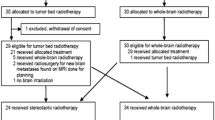Abstract
The aim of this article is to evaluate and assess the impact of various factors on quality of life (QOL) in adult patients with primary brain tumors seen consecutively in routine neurooncology practice. Two hundred and fifty-seven adult patients, after undergoing surgical intervention and histologically proven primary brain neoplasms were registered in the NeuroOncology Clinic at our centre during 1 full calendar year. The study included detailed neurological assessment, evaluation of QOL using EORTC questionnaire (QLQ-30) and specific Brain Cancer module (BN 20). In the present analysis, QOL scores before starting adjuvant treatment were measured and impact of patient and tumor related factors were analyzed. Baseline global QOL data of all patients (available in 243) was relatively low including in all histological tumor types. Physical function, role function, emotion function, cognitive and social function scores were 80, 78, 65.7, 70 and 70.5 (higher values better), respectively. Domains of future uncertainty, visual disorder, motor deficit, communication deficit, headache, seizures and drowsiness scores were 19.6, 18.2, 28.5, 30.7, 21, 31.8 and 16 (lower values better), respectively. Elderly patients had poorer global score (21 points difference; p = 0.161). Patients with lower performance status (KPS < 70) had a lower global QOL (KPS ≥ 80 vs. ≤ 70; 37 vs. 67; p = 0.001) including in all histological types of high-grade gliomas (HGG) (p = 0.005), low-grade gliomas (LGG) (p = 0.04) and benign tumors (p = <0.001). Illiterate patients had lower QOL score (p = 0.005). Tumor type is an important patient related factor that influences baseline global scores (LGG vs. HGG 62 and 52; p = 0.015). Economic status significantly influence QOL scores in HGG (p = 0.052). Type of surgery (biopsy/complete excision) (p = 0.284) and site of tumor (p = 0.309) did not show any impact on QOL score. Patients with primary brain tumours before starting adjuvant therapy have relatively low baseline quality of life scores, especially in lower economic and literacy strata. Patients with malignant tumors and poor performance status had significantly lower QOL scores even before starting adjuvant treatment.
Similar content being viewed by others
References
Efficace F, Bottomley A (2002) Health related quality of life assessment methodology and reported outcomes in randomised controlled trials of primary brain cancer patients. Eur J Cancer 38:1824–1831
Aaronson NK, Ahmedzai S, Bergman B (1993) The European Organisation for Research and Treatment of Cancer QLQ-C30: a quality-of-life instrument for use in international clinical trials in oncology. J Natl Cancer Inst 85:365–376
Taphoorn M, Stupp R, Coens C, Osoba D, Kortmann R, Bent M (2005) Health-related quality of life in patients with glioblastoma: a randomised controlled trial. Lancet Oncol 6:937–944
Osoba D, Brada M, Prados M, Yung W (2000). Effect of disease burden on health-related quality of life in patients with malignant gliomas. Neuro Oncol 2:221–228
Budrukkar A, Jalali R, Kamble R, Parab S (2006) Translation and pilot validation of Hindi translation of assessing quality of life in patients with primary brain tumours using EORTC brain module (BN-20). J Cancer Res Ther 2(4):166–170
Osoba D, Aaronson NK, Muller M (1996) The development and psychometric validation of a brain cancer quality-of-life questionnaire for use in combination with general cancer-specific questionnaires. Qual Life Res 5:139–150
Osoba D, Rodrigues G, Myles J (1998) Interpreting the significance of changes in health-related quality-of-life scores. J Clin Oncol 16:139–144
Addeo R, Caraglia M, Faiola V, Capasso E, Vincenzi B, Montella L, Guarrasil R, Caserta L, Prete SD (2007) Concomitant treatment of brain metastasis with whole brain radiotherapy [WBRT] and temozolomide [TMZ] is active and improves quality of life. BMC Cancer 7:18
Jalali R, Datta D (2008) Prospective analysis of incidence of central nervous system tumours presenting in a tertiary cancer hospital from India. J Neurooncol 87:111–114
Klein M, Heimans J, Aaronson N (2002) Mid- to long-term cognitive sequelae in low-grade gliomas: the impact of radiotherapy and other treatment-related factors. Lancet 360:1361–1368
Brown PD, Ballman KV, Rummans TA, Maurer MJ, Sloan JA, Boeve BF (2006) Prospective study of quality of life in adults with newly diagnosed high-grade gliomas. J Neurooncol 76(3):283–291
UICC population survey in cancer related beliefs and behaviors. www.uicc.org/templates/uicc/pdf/survey/survey/.pdf
Jalali R, Dutta D, Kamble R, Gupta T, Munshi A, Sarin R (2008) Prospective assessment of activities of daily living using modified Barthel’s scoring system in children with low-grade gliomas treated with stereotactic conformal radiotherapy. J Neurooncol 90(3):321–328
Dutta D, Vanere P, Gupta T, Munshi A, Jalali R (2009) Factors influencing activities of daily living using FIM-FAM scoring system before starting adjuvant treatment in patients with brain tumors: results from a prospective study. J Neurooncol [PMID: 19255726]
Acknowledgements
We are grateful to the Brain Tumour Foundation of India (www.braintumourindia.com) for supporting this work
Author information
Authors and Affiliations
Corresponding author
Rights and permissions
About this article
Cite this article
Budrukkar, A., Jalali, R., Dutta, D. et al. Prospective assessment of quality of life in adult patients with primary brain tumors in routine neurooncology practice. J Neurooncol 95, 413–419 (2009). https://doi.org/10.1007/s11060-009-9939-8
Received:
Accepted:
Published:
Issue Date:
DOI: https://doi.org/10.1007/s11060-009-9939-8




